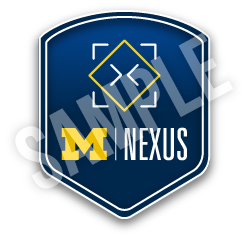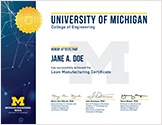FOUNDATIONS OF MOBILITY
Mobility Systems Design, Finance, and Regulation
Home » Professional Education » Foundations of Mobility » Course II: Mobility Systems Design, Finance, and Regulation
Key Information
Course Dates
Time Commitment
Approximately 125 self-paced hoursCOURSE II
The 15-week online Mobility Systems Design, Finance, and Regulation course covers the impact of mobility systems on communities, ranging from community development, urban design, individual choice, and regulatory considerations within the scope of transportation and autonomous vehicles.
LEARNING OBJECTIVES
By the end of this two-course program, students will be able to:
- Define mobility as it relates to multiple disciplines, areas of expertise, and stakeholders (mobility as an ecosystem)
- Identify challenges and successes when employing mobility concepts.
- Apply mobility ecosystem concepts and techniques to solve specific mobility challenges.
PROGRAM OVERVIEW
In this online course, you will learn from a multidisciplinary team of experts from the U-M Transportation Research Institute, Law School, School of Business, School of Architecture and Urban Planning, and Department of Civil and Environmental Engineering. In addition to the impact of mobility on communities, the course covers the impacts of various modal options, such as ride-sharing, along with their economic impacts. You will learn about modeling and optimization of transport systems to achieve sustainability and economic efficiency. Approaches to project finance, public/private partnerships, data valuation, and efficient financing mechanisms and models are also covered, along with legal and regulatory considerations associated with both existing and developing modes of transportation.
Course Outline
Instructor
James Sayer, PhD
- Director, University of Michigan Transportation Research Institute (UMTRI)
Module Overview
In this introductory module, Dr. Jim Sayer provides an overview of the course so you know what to expect as you progress through the material. You will also review various use cases to better understand how individuals are affected by some of the decisions/actions covered in the course’s different topic areas. This module also provides information about the course schedule and navigation, and offers you an opportunity to introduce yourself to your instructors and classmates.
Module Topics
- Course Overview
- Use Cases
- Course Schedule & Navigation
- Student Introductions
Instructor
Robert Goodspeed, PhD
- Assistant Professor, Taubman College of Architecture and Urban Planning
Module Overview
This module digs into transportation planning and urban design, unpacking how mobility fits within our cities and how emerging modes and technologies impact these planning efforts. You will learn about current trends in urbanization, sustainable development frameworks, new planning methods, and challenges associated with innovation and uncertainty. Key lectures on scenario planning, along with expert guest discussions, provide added insight and context throughout this module.
Module Topics
- Current Urban Change and the Sustainable Mobility Paradigm
- Current Trends in Urbanization
- The Sustainable Mobility Paradigm
- Scenario Planning: A Method for Planning Systems with Uncertainty
- Introducing Scenario Planning
- Transportation Scenarios
- Applying Scenarios to AV and New Mobility
- Guest Discussion: Lisa Nielson
- How Does Mobility Fit Within Urban Sustainability Frameworks?
- Sustainable Development Goals
- Smart Growth
- New Urbanism
- Vision Zero
- Rethinking Streets
- Moving People and Freight Efficiently
- Emerging Street Design Guides
- Mobility hub
- Guest Discussion: Geoff Thun, Taubman College
- Planning for Emerging Modes: Bikesharing, Ridesharing, and Urban Aerial Vehicles
- Bikesharing and Micro-Mobility
- Ridesharing
- Urban Aerial Vehicles
- What’s Next?
- Scenarios for Autonomous Urbanism
- The Challenge of Creating Smart Urban Innovations
Instructor
Neda Masoud, PhD
- Assistant Professor, Civil and Environmental Engineering
Module Overview
This module defines mode choice and examines its importance to transportation planners. You will learn about traditional and new modes of transportation, how travelers make choices, and predictive mode choice models. The module also covers data for mode choice and its impact on quality of life — and whether we can change travelers’ mode choice behavior. Flexible transit, multi-modal transportation, freight mode choice, and the effects of emerging mobility technology on mode choice are also explored. By the end of the module, you will understand what mode choice is, why mode choice modeling is important, and the implications of mode choice decisions.
Module Topics
- Introduction:
- What is Mode Choice?
- 4-Step Planning Process
- Passenger Mode Set
- Traditional Modes
- New and Emerging Modes
- How Travelers Make Choices
- Factors Affecting the Psych of the Travelers
- Discrete Choice Models
- Different Structures of Choice Models
- Data for Mode Choice
- Types of Data Required for Passenger Mode Choice Models
- How This Data Can Be Collected
- Impact of Mode Choice on Quality of Life
- The Inverse Correlation Between Private Vehicle Demand and Quality of Life
- The Impact of Green Modes of Transportation and Shared-Use Services
- Can we Change Travelers’ Mode Choice Behavior?
- Incentives to travelers and service providers
- Flexible Transit
- Public Transportation and the Shift from Fixed-Route to More Flexible and Demand-Responsive Services
- Multi-Modal Transportation
- How Service Provider Collaboration Can Improve Accessibility and Level of Service to Travelers
- New Technology and Mode Choice
- The Effects of Autonomy, Connectivity, and Electrification on Passenger Mode Choice
- Freight Mode Choice
- Modes Used for Freight Transportation
- Modes for Different Types of Commodities
Instructor
Peter Adriaens, PhD
- Professor, Civil and Environmental Engineering
Module Overview
This module explores transportation and mobility infrastructure finance, including the structure and sources of financing, public and private financing models, tokenization, and finance in the digital era. After gaining a fundamental understanding of investable assets and the risk and reward framework, you will learn about public transportation financing — public-private partnerships, tax increment financing, and value capture finance — along with private mobility and transportation models. The module then examines blockchain finance in transportation and mobility, including the Mobility Open Blockchain Initiative (MOBI), before concluding with a look at the future of mobility and finance in the digital era.
Module Topics
- Introduction to Transportation and Mobility Infrastructure Finance
- Infrastructure, Performance and Economic Growth
- Investable Infrastructure Assets
- Risk and Return Framework for Financing Infrastructure
- Financing of the Transportation Infrastructure Ecosystem
- Infrastructure and Mobility Ecosystem Structure
- Sources of Financing and Funding for Infrastructure
- Sources of Financing and Funding for Mobility
- Public Transportation Infrastructure Financing
- Public-Private-Partnerships
- Tax Increment Financing
- Value Capture Finance
- Private Mobility and Transportation Infrastructure Financing
- Toll Roads
- Intelligent Infrastructure Systems
- Integrating Public and Private Finance for V2I Applications
- Blockchain, Tokenization, and Mobility
- The Blockchain Value Proposition
- Infrastructure Blockchain Finance
- Blockchains in Transportation and Mobility: MOBI and Beyond
- The Future of Mobility and Finance in the Digital Era
- Application Use Case
Instructor
Ian Williams, Esq.
- Fellow for the Law and Mobility Program, University of Michigan Law School
Module Overview
New mobility systems have the potential to transform the way people and goods move about, creating significant legal, regulatory, and policy issues. This module covers everything from the current structure of mobility law to broader societal issues such as transportation priorities, data use, and equity. You will learn about local, state, and federal laws impacting mobility, along with the evolving regulations around new technologies like connected vehicles and ride-sharing apps. By the end of this module, you will have a strong understanding of the many legal, regulatory, and policy implications of modern mobility.
Module Topics
The Current Structure of Mobility Law and Regulation
- Local Law/Regulation
- Local Traffic Law/Law Enforcement
- Transportation Planning/Land Use
- Public Transit
- Funding – Public vs. Private
- State Law/Regulation
- State Traffic Law/Law Enforcement
- Drivers Licensing
- Vehicle Registration
- Transportation Planning/Land Use
- Public Transit
- Funding – Public vs. Private
- Federal Law/Regulation
- Federal Regulations
- USDOT and its Agencies
Law, Regulation, and New Mobility Technology
- Connected and Automated Vehicles
- Legal Issues
- Local vs. State vs. Federal Control
- Ride Sharing
- Ability to Regulate – State vs. Local Government
- Similarities and Differences to Regulating Taxis
- Additional Considerations (e.g. Employment Law)
- Micro-Mobility
- How Cities Have Handled Micro-Mobility
- Drones/Urban Air Mobility
- Current FAA regulation
- Role of States/Cities/etc.
- Speculative Technologies
- The Hyperloop – How Governments Are Exploring Speculative Technologies
- Policy Debate
- Regulatory Challenges
Additional Legal, Regulatory, and Policy Issues
- Transportation Priorities
- What do Communities Want and Need?
- How do Governments Determine Such Priorities?
- Data Generated by Mobility Technologies
- Ownership and Privacy
- Government Use of Data
- Police Access
- Equity – Who Are These Systems For?
- Accessibility
- Access Across Economic Statuses
Instructor
James Sayer, PhD
- Director, University of Michigan Transportation Research Institute (UMTRI)
Module Overview
Dr. Jim Sayer concludes the course by reviewing the use cases discussed in the opening module and summarizing the importance of taking an “ecosystems” approach to mobility. You will also have an opportunity to take a short survey following the course.
Module Topics
- Conclusion
- Review of Use Cases
- Taking an Ecosystem Approach
- End of Course Survey
In addition to each expert-led module, this course will include interviews with key innovators and practitioners in the mobility sector.
- You will have access to the Mobility Systems Design, Finance, and Regulation course for 15 weeks.
- Each course module contains 6-8 hours of required recorded material and associated testing assessments.
- In its entirety, the course contains 30 hours of recorded instruction, with approximately 95 additional hours of readings, exercises, and assessments.
In addition to self-paced learning, you will have the opportunity to engage with U-M faculty via email.
- You must successfully complete all course modules, readings, and testing assessments with an 80% pass rate to earn a digital badge for this course.
- To earn a Certificate in Foundations of Mobility, successful completion of this course and Course I: Mobility Behavior and Technology is required.
There are no prerequisites for this course.
To view technical requirements, click here.
Administrative/Online Technical Support
Support staff are available via phone and email to help with administrative and technical issues during our normal business hours (Monday through Friday 8:00 a.m. to 5:00 p.m. Eastern Time). Contact us at [email protected].
Content Questions and Support
Candidates are welcome to contact the course instructors and/or their course assistants with content-related questions and support.
INSTRUCTIONAL TEAM


Robert Goodspeed, PhD
- Assistant Professor, Taubman College of Architecture and Urban Planning




